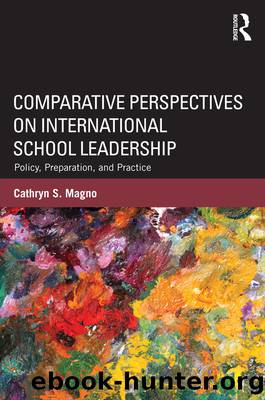Comparative Perspectives on International School Leadership by Magno Cathryn S.;

Author:Magno, Cathryn S.;
Language: eng
Format: epub
Publisher: Taylor & Francis Group
5
Perspectives from Mongolia
Standards Spreading and Structures Sticking: Leadership Accountability in Mongolia1, 2
Education reform in Mongolia in the recent era began with the countryâs transition from a socialist to a democratic state in 1990. During the past two decades, Mongolia has undergone numerous changes to its education laws and provision mechanisms. Most of the changes have been enabled by international development aid from agencies such as the World Bank and the Asian Development Bank, along with other inter-governmental organizations such as UNESCO and international non-governmental organizations. All of these have sought to democratize education in Mongolia through new curricular and pedagogical initiatives. International agencies have carried with them certain mandates and specified areas of interest; school management3 has been a very recent focus since the late-2000s. International aid has brought with it international âexpertsâ4 who, purposely or not, become âpolicy actorsâ by infusing Western theoretical and practical advice into policy recommendations and potential programming. This happens as representatives from the World Bank as well as the Ministry look externally for international standards on which to model Mongolian standards. Local NGO actors are actively seeking ways to engage with school leaders, and have provided a few trainings to date. While it seems from this case that concepts are purposely borrowed for use in the Mongolian context, it also shows local structures, skills, and understandings which interrupt the sense of common beliefs and institutional isomorphism. This local contextualization demonstrates the powerful interplay between funding and knowledge, and the difficulty in building truly indigenous forms of operating.
Leadership Policy in Mongolia
Reform in Mongolian education is guided by the 1992 constitution in which every child is guaranteed the right to a free education. In 1995 the Education Law was revised to âremove socialist ideologyâ and it outlined principles such as equality of educational opportunity (UNESCO, 2011). Subsequent revisions of the Education Law (in 2003, 2006, and 2008), along with additional legal documents, such as the State Education Policy and the Primary and Secondary Education Law, delineate educational goals including openness in educational administration and administrative decentralization of educational management to aimags (provinces).
The Ministry of Education, Culture, and Science (MECS) remains a central authority of school governance. MECS is responsible for defining policies, ensuring compliance with education laws, organizing professional development for education professionals, and providing a nationwide system of education. In every province, there is an Education and Culture Department (ECD) which oversees education performance and finance. The ECD is responsible for processes such as the hiring and firing of school directors.5 Each local school district is governed by a School Council consisting of teachers, students, parents, and members of the community.6 MECS is interested in building capacity for decision making at the school level, with one official saying, âwe need to give more power to the school-level leadersâ (Int 1).
An important trend is the move to a standards-based approach to school improvement (Steiner-Khamsi & Stolpe, 2006). To that end, MECS signed a Memorandum of Understanding with Cambridgeâwhich focuses on the whole school and the teaching and learning environment, in 2010âand have trained teachers in pilot schools.
Download
This site does not store any files on its server. We only index and link to content provided by other sites. Please contact the content providers to delete copyright contents if any and email us, we'll remove relevant links or contents immediately.
The Art of Coaching Workbook by Elena Aguilar(50421)
Trainspotting by Irvine Welsh(21220)
The Secret History by Donna Tartt(18462)
Twilight of the Idols With the Antichrist and Ecce Homo by Friedrich Nietzsche(18389)
All the Missing Girls by Megan Miranda(15083)
Cat's cradle by Kurt Vonnegut(14927)
Ready Player One by Cline Ernest(14214)
Talking to Strangers by Malcolm Gladwell(13023)
Fangirl by Rainbow Rowell(8889)
The Compound Effect by Darren Hardy(8637)
Thirteen Reasons Why by Jay Asher(8604)
The remains of the day by Kazuo Ishiguro(8567)
Tools of Titans by Timothy Ferriss(8007)
Periodization Training for Sports by Tudor Bompa(8006)
Wonder by R. J. Palacio(7803)
The Lover by Duras Marguerite(7653)
Change Your Questions, Change Your Life by Marilee Adams(7481)
A Court of Wings and Ruin by Sarah J. Maas(7423)
The Complete Stick Figure Physics Tutorials by Allen Sarah(7200)
